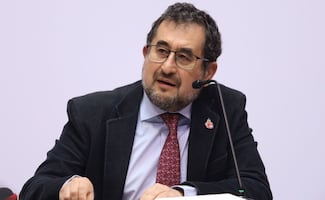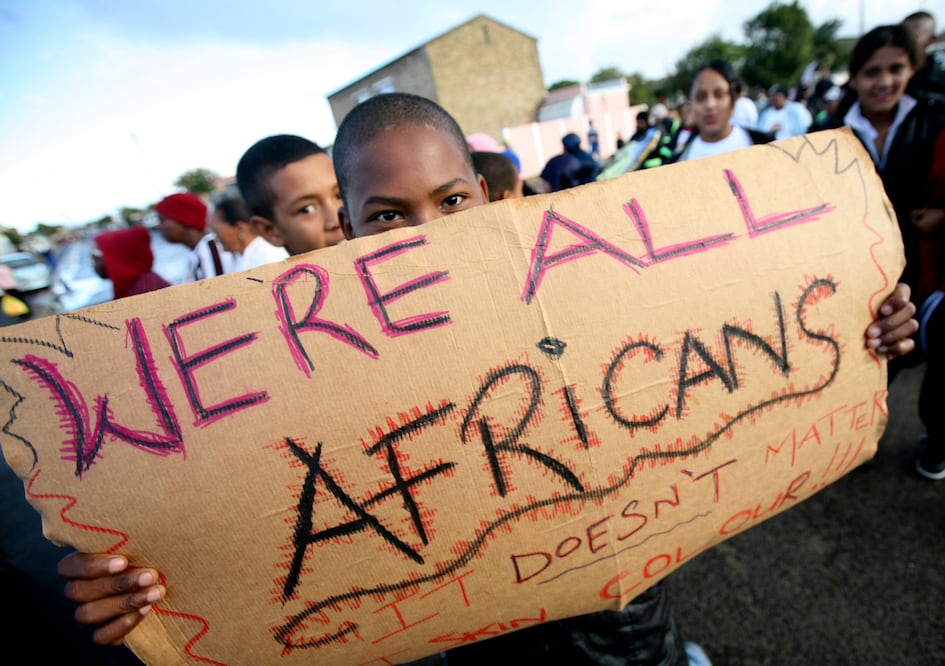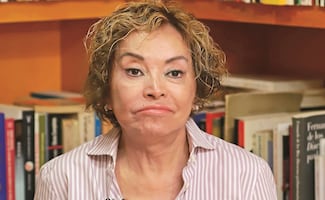Más Información

Cravioto descarta conflicto de interés con Fundación Haghenbeck; dice haber pagado 20 mil pesos mensuales de renta por departamento

Cédula profesional deja de ser un documento de identificación oficial; CURP es la "fuente única de identidad"
The xenophobic violence and looting unleashed in South Africa last week that has deteriorated its regional relations and international image are a reflection of a bigger problem, the economic and political crisis undermining the country’s 25-year-old post-apartheid model .
Anti-migrant riots
in Johannesburg and Pretoria caused at least 10 deaths , including two foreigners, and more than 400 arrests ; protesters and looters destroyed millions of dollars of private property, leaving businesses and homes burned, and streets littered with burning tires, while the government of President Cyril Ramaphosa deployed police in riot gear with tear gas and rubber bullets.
The clashes also prompted a diplomatic row between South Africa and its continental rival Nigeria , after President Muhammadu Buhari of the latter country announced he will send a special envoy to investigate the situation, and South African authorities temporarily closed its diplomatic missions in Abuja and Lagos in reaction.
Nearly 600 Nigerian citizens were repatriated from Johannesburg on Wednesday; however, Abike Dabiri , head of the Nigerians in Diaspora Commission , said her government would not provide financial assistance to those leaving the country. She added that Abuja would continue to hold South Africa accountable and insist it paid compensation to its citizens affected.
The African Union condemned the riots in “the strongest terms”. There have been violent demonstrations at South African diplomatic missions and businesses in Zambia and the Democratic Republic of Congo ( DRC ); Air Tanzania suspended flights to Johannesburg, and Nigerian celebrities, as well as the Zambian and Madagascan national soccer teams, withdrawn from scheduled appearances to protest the riots.
For South Africa , the timing could not have been worse, as the nation hosted on 4-6 September the annual World Economic Forum ( WEF ) meeting on Africa in Cape Town , in an attempt to attract investors and reactive its sluggish economy .
Delegations from Rwanda —which is trying to replace its giant neighbor’s position as the favorite destination for Western capitals on the continent,— Malawi and the DRC withdrew their participation in the meeting (according to the WEF Malawi and Rwanda withdrew before the attacks for other reasons.)
So-called “ Afrophobia ” is an old problem in South Africa, yet the latest wave of attacks were reminiscent of the xenophobic violence of 2008 that left 62 dead and ended, along with the 2012 massacre of 34 striking miners in Marikana , the idyllic phase of the post-apartheid model built upon the African National Congress ( ANC ) political hegemony.
Although Ramaphosa stressed that “the majority of foreign nationals in our country are law-abiding and have the right to conduct their lives and businesses in peace”—Pretoria launched in March a plan to combat racism and discrimination,— ANC , opposition and traditional leaders alike have engaged in anti-foreign rhetoric blaming minorities for economic stagnation , disease outbreaks , crime , and drugs .
Authorities blame others
Police Minister Bheki Cele
, for instance, accused “criminal elements that are taking advantage of a volatile situation,” while Foreign Minister Naledi Pandor declared that “there is a targeting of Africans from other parts of Africa, we can’t deny that. But there is also criminality because a lot of this is accompanied by theft.”
According to official statistics, South Africa has more than 60 million inhabitants , including 3.6 million migrants . Most of these migrants are from Zimbabwe , Mozambique , and Lesotho . The Nigerian population amounts to just over 30,000 , or about 2% of foreign-born residents, yet during the riots, this month looters specifically targeted Nigerians for alleged criminal activity.
Though foreign-born residents are such a small part of the population, many South Africans routinely scapegoat them, especially for “taking jobs.” In the context of the “ rainbow nation ” high unemployment rate—29% in the first quarter of 2019, with unemployment for 15- to 24-year-olds at more than 55%,— these accusations are as throwing petrol onto a fire.
In spite of the state propaganda depicting the country as the powerhouse of Africa and a member of the BRICS bloc , the economy grew only 0.8% in 2018. More than half of the population lives below the poverty line , with per capita income of USD $90 or less a month , making South Africa the most unequal nation in the world .
Only 13% of all South Africans earn more than USD $6,000 a year , yet there are ten billionaires who collectively control more than USD $30 billion . The top 1% own 70% of the wealth, while the bottom 60% own a mere 7%. Basic services are non-existent in many townships and nearly 80% of nine and ten-year-old s are only semi-literate .
Gender violence
in South Africa is so widespread that thousands marched in Cape Town during the WEF meeting to protest the government’s failure to protect women; this past August was the deadliest month for violent crimes against women the country has ever seen.
After the pervasive corruption which characterized the period of President Jacob Zuma , South Africa held general elections on May 8 and Ramaphosa won a full five-year term.
Nevertheless, the process marked the first time in the ANC’s post-apartheid history that its vote fell below 60% to stand at 58%.
Overall voter turnout fell to 66% from 73% . The majority of the 10 million people who did not even bother to register to vote, some six million, are under the age of 30, reflecting the growing disillusion among the younger generation born after the historic struggle of Nelson Mandela .
Ramaphosa
, former head of the National Union of Mineworkers —he demanded the authorities to repress the strikers in Marikana—ousted Zuma and became the leader of the ANC in 2017 ; months later, he took power as President of South Africa in February 2018 , promising to eradicate corruption and speed up the creation of jobs.
The South African leader was the head of the Black Economic Empowerment ( BEE ) program at Marikana during the 2012 tragic workers strike and owned a 9% share in the United Kingdom-based Lonmin company. He is now worth an estimated USD $550 million and has become a symbol of ANC’s well-connected leaders and privileged middle classes who have grown rich abusing the BEE.
It remains unclear what kicked off the latest round of “ Afrophobia ;” however, South African and American press reports pointed out a fake quote attributed to comedian Trevor Noah fomenting anger toward white South Africans which went viral, spreading across Sub-Saharan Africa to right-wing media in the United States.
On social media, images from past episodes of violence in South Africa have circulated widely; in fact, Julius Malema , the populist leader of the Economic Freedom Fighters party and himself a millionaire, echoed the racist fake news tweeting that “our anger is directed at wrong people. Like all of us, our African brothers & sisters are selling their cheap labor for survival. The owners of our wealth is [sic] white monopoly capital; they are refusing to share it with us & the ruling party #ANC protects them.”
Editing by Sofía Danis
More by Gabriel Moyssen
Noticias según tus intereses
[Publicidad]
[Publicidad]











